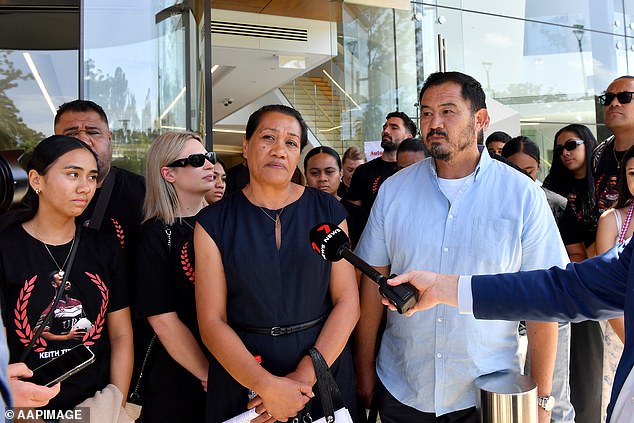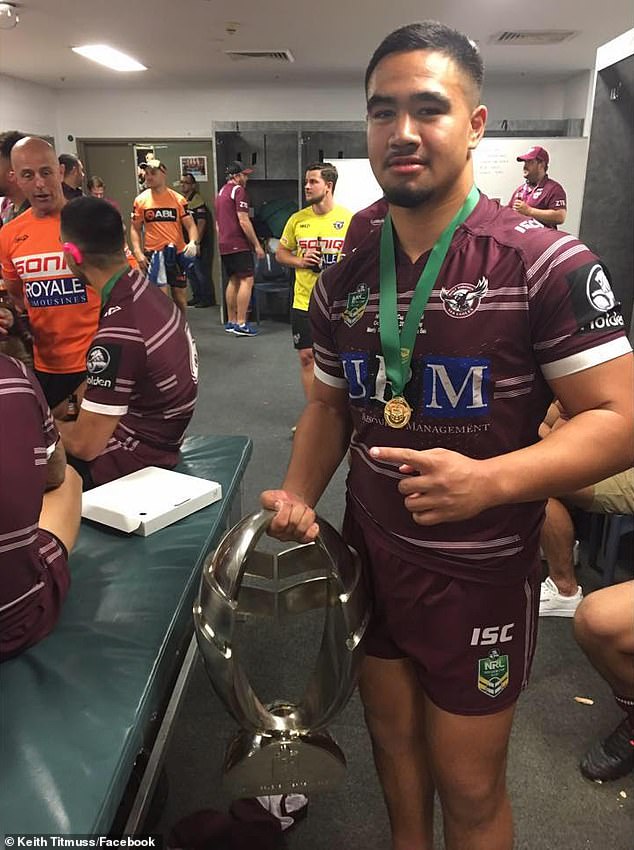- A young rugby player had developed a fatal brain disease at the age of 20
- Contact sports urged to do more to reduce head injuries
- READ MORE: AFL star’s horrific injuries revealed
A rugby player who died aged 20 after an “inappropriate” training session with his Sydney club had already developed an insidious brain disease caused by repeated blows.
In an alarming warning to all parents and players, Manly Sea Eagles youngster Keith Titmuss was diagnosed with chronic traumatic encephalopathy (CTE) when he died from exertional heat stroke in November 2020.
A forensic investigation concluded that he had become agitated and suffered several seizures after taking part in a two-hour training session that was “probably inappropriate”.
Paramedics were called to check Titmuss’s body temperature three times after he collapsed during training because they could not believe he had reached almost 42C.
But doctors were even more shocked to later discover that the talented young athlete had developed stage two CTE at such a young age.
The discovery makes Titmuss the youngest Australian athlete to be diagnosed with the deadly disease.
The finding, made by respected neuropathologist Michael Buckland, is sure to send shockwaves through the country’s major sporting codes and raise questions about whether they are doing enough to protect the country’s emerging athletes.
Dr Buckland told The Weekend Australian the discovery meant players were starting to develop the incurable brain disease earlier than previously suspected.
Late Manly Sea Eagles youngster Keith Titmuss has become Australia’s youngest athlete to be diagnosed with the fatal brain disease known as chronic traumatic encephalopathy.

The rising star of the league died after a training session at his Sydney club.
“Keith’s brain shows us that, at least in some cases, CTE actually begins during a person’s gaming career and starts very young,” Dr. Buckland said.
‘I really didn’t expect to see CTE because of his age.
“What this finding tells us is that no matter how good your concussion management is, or whether you don’t even get a concussion, what matters is that the high exposure to repeated impacts, many of which will not be concussive, are still causing subtle damage to the brain that causes CTE.”
Unlike veteran league legends such as Mario Fenech, Robbie O’Davis and Wally Lewis, Titmuss developed the disease without ever having received a blow to the head at the highest level.
Instead, playing the contact sport for 15 years at the youth level appears to have been enough to cause the fatal condition.
The Titmuss family told The Weekend Australian they hoped the discovery would be a wake-up call for all contact sports that more needs to be done to reduce the number of head knocks during games.
“This could lead to the rules of sport being changed and therefore impact our enjoyment of the sporting entertainment we love,” his parents, Lafo and Paul, told The Weekend Australian.
‘However, the rules of the game must continually evolve to avoid injuries to our athletes.
‘The death of nerve cells in the brain is a serious issue that our community must consider and address.

Lafo and Paul Titmuss have called for a crackdown on head injuries in youth sport after their talented late son was found to have developed a fatal brain disease at the age of just 20.

Respected neuropathologist Michael Buckland says he was shocked by the discovery.
‘We may need stricter safety measures and rules for all sports to protect the brains of our athletes and enrich their quality of life after sport.
‘Dr Michael Buckland’s research is crucial and his findings should be recognised by all sporting codes that have experienced incidents involving head injuries.
‘That is why we urge all sporting governing bodies to take responsibility for continually reviewing their rules on head injuries and prevention measures for the quality of life of each athlete.’
Dr Buckland told the paper that Titmuss’s case showed that young people who played contact sports were at risk of CTE.
“He had very early and intense exposure, and I think all parents should be thinking about the long-term brain health of their children and asking themselves whether the codes are doing enough,” Dr. Buckland said.
(tags to translate)dailymail


